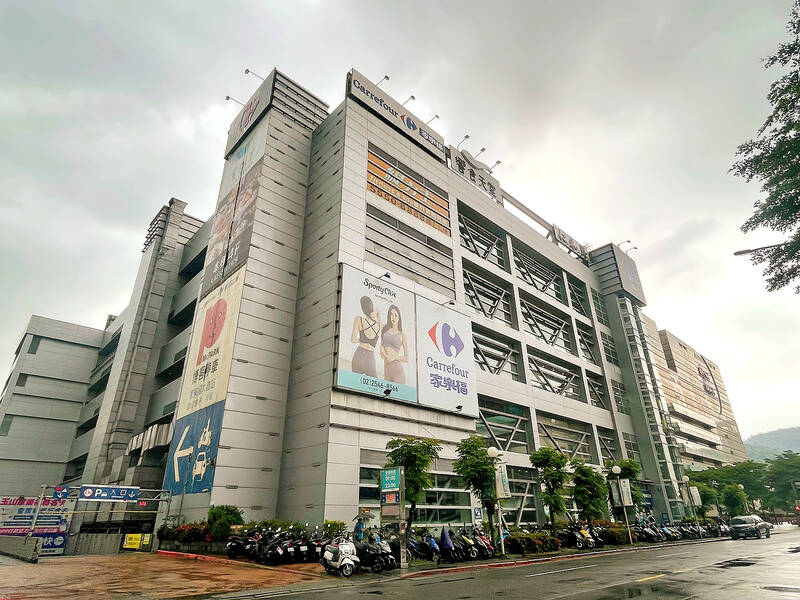The Fair Trade Commission (FTC) on Friday said that it has approved food and retail conglomerate Uni-President Group’s (統一集團) bid to take full ownership of hypermarket operator Carrefour Taiwan (家樂福), with several conditions attached.
The commission said the acquisition was approved on Wednesday.
To protect the interests of small and medium-sized suppliers and curb monopolistic price gouging, the conglomerate must not take advantage of its dominant distribution channels to discriminate against suppliers without legitimate reasons, the commission said.

Photo: CNA
In the three years following the acquisition, Presicarre Corp (家福) should maintain its special transaction program for small and medium-sized suppliers — those with annual trading value of less than NT$1 million (US$32,636) — and ensure that any change to the program does not put those suppliers in a less favorable position, the commission added.
Presicarre, the operator of Carrefour Taiwan, was established by Carrefour SA and Uni-President in 1987 as a joint venture to introduce hypermarkets to Taiwan under the Carrefour brand.
For three years after the closing of the acquisition, Presicarre and Uni-President may not discuss “copurchasing” of goods with individual suppliers, unless requested by the latter, the commission said.
During that period, Uni-President must submit a report to the commission by June 1 every year to verify that it has complied with the conditions.
The agency also stipulated several conditions about the composition of the board of directors at Presicarre after the acquisition.
Uni-President Group in July last year announced that its two affiliates — President Chain Store Corp (統一超商) and Uni-President Enterprises Corp (統一企業), which together hold 40 percent of Carrefour Taiwan — had agreed to take full ownership of Carrefour Taiwan by acquiring the 60 percent stake owned by the hypermarket’s French parent company.
The group at the time said that Uni-President Enterprises would acquire an additional 49.5 percent share in Carrefour Taiwan for NT$23.9 billion and President Chain Store would acquire 10.5 percent for NT$5.1 billion.
The NT$29 billion valuation translates into a price of about NT$65 per share, Uni-President said.
Following the acquisition, Uni-President Enterprises would have a 70 percent stake in Carrefour Taiwan and President Chain Store would have 30 percent, it said.

Taiwan Semiconductor Manufacturing Co (TSMC, 台積電) would not produce its most advanced technologies in the US next year, Minister of Economic Affairs J.W. Kuo (郭智輝) said yesterday. Kuo made the comment during an appearance at the legislature, hours after the chipmaker announced that it would invest an additional US$100 billion to expand its manufacturing operations in the US. Asked by Taiwan People’s Party Legislator-at-large Chang Chi-kai (張啟楷) if TSMC would allow its most advanced technologies, the yet-to-be-released 2-nanometer and 1.6-nanometer processes, to go to the US in the near term, Kuo denied it. TSMC recently opened its first US factory, which produces 4-nanometer

GREAT SUCCESS: Republican Senator Todd Young expressed surprise at Trump’s comments and said he expects the administration to keep the program running US lawmakers who helped secure billions of dollars in subsidies for domestic semiconductor manufacturing rejected US President Donald Trump’s call to revoke the 2022 CHIPS and Science Act, signaling that any repeal effort in the US Congress would fall short. US Senate Minority Leader Chuck Schumer, who negotiated the law, on Wednesday said that Trump’s demand would fail, while a top Republican proponent, US Senator Todd Young, expressed surprise at the president’s comments and said he expects the administration to keep the program running. The CHIPS Act is “essential for America leading the world in tech, leading the world in AI [artificial

REACTIONS: While most analysts were positive about TSMC’s investment, one said the US expansion could disrupt the company’s supply-demand balance Taiwan Semiconductor Manufacturing Co’s (TSMC, 台積電) new US$100 billion investment in the US would exert a positive effect on the chipmaker’s revenue in the medium term on the back of booming artificial intelligence (AI) chip demand from US chip designers, an International Data Corp (IDC) analyst said yesterday. “This is good for TSMC in terms of business expansion, as its major clients for advanced chips are US chip designers,” IDC senior semiconductor research manager Galen Zeng (曾冠瑋) said by telephone yesterday. “Besides, those US companies all consider supply chain resilience a business imperative,” Zeng said. That meant local supply would

Servers that might contain artificial intelligence (AI)-powering Nvidia Corp chips shipped from the US to Singapore ended up in Malaysia, but their actual final destination remains a mystery, Singaporean Minister for Home Affairs and Law K Shanmugam said yesterday. The US is cracking down on exports of advanced semiconductors to China, seeking to retain a competitive edge over the technology. However, Bloomberg News reported in late January that US officials were probing whether Chinese AI firm DeepSeek (深度求索) bought advanced Nvidia semiconductors through third parties in Singapore, skirting Washington’s restrictions. Shanmugam said the route of the chips emerged in the course of an